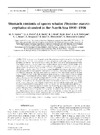Please use this identifier to cite or link to this item:
https://accedacris.ulpgc.es/jspui/handle/10553/49440
| Title: | Stomach contents of sperm whales Physeter macrocephalus stranded in the North Sea 1990-1996 | Authors: | Santos, M. B. Pierce, G. J. Boyle, P. R. Reid, R. J. Ross, H. M. Patterson, I. A.P. Kinze, C. C. Tougaard, S. Lick, R. Piatkowski, U. Hernández-García, V. |
UNESCO Clasification: | 240119 Zoología marina | Keywords: | Feeding ecology Cetacea Stranding Gonatus Cephalopoda |
Issue Date: | 1999 | Publisher: | 0171-8630 | Journal: | Marine Ecology - Progress Series | Abstract: | Stomach contents of 17 sperm whales Physeter macrocephalus stranded in Scotland and Denmark during 1990-96 were analysed. All were sub-adult or adult males and stranded between November and March. They had presumably entered the North Sea during their southward migration from feeding grounds in Arctic waters. Other studies indicate that the majority of the whales were apparently healthy. The diet of these whales was found to consist almost entirely of cephalopods, principally squid of the genus Gonatus (hereafter 'Gonatus', but probably G. fabricii, an oceanic species characteristic of Arctic waters). The other prey species identified were also mostly oceanic cephalopods: the squids Histioteuthis bonnellii, Teuthowenia megalops and Todarodes sagittatus and the octopus Haliphron atlanticus. Although these results are consistent with other recent studies in the area based on single stranded whales, they differ from results of work on whales caught during commercial whaling operations in Icelandic waters (1960s to 1980s) in that little evidence of predation on fish was found in the present study. Remains of single individuals of the veined squid Loligo forbesi, the northern octopus Eledone cirrhosa and the saithe Pollachius virens provided the only possible evidence of feeding in the North Sea. We infer that sperm whales do not enter the North Sea to feed. The timing, and large and uniform sizes of the Gonatus species eaten (most had mantle lengths in the range 195 to 245 mm), as estimated from measurements of the lower beaks, and the seasonality of the strandings is consistent with the whales having fed on mature squid, possibly spawning concentrations--as has recently been reported for bottlenose whales. Assuming that the diet recorded in this study was representative of sperm whales during the feeding season, as much as 500000 t of Gonatus could be removed by sperm whales in Norwegian waters each year and up to 3 times that figure from the eastern North Atlantic as a whole. Evidence from other studies indicates that Gonatus is an important food resource for a wide range of marine predators in Arctic waters. | URI: | https://accedacris.ulpgc.es/handle/10553/49440 | ISSN: | 0171-8630 | DOI: | 10.3354/meps183281 | Source: | Marine Ecology Progress Series [ISSN 0171-8630], v. 183, p. 281-294 |
| Appears in Collections: | Artículos |
SCOPUSTM
Citations
79
checked on Jun 8, 2025
WEB OF SCIENCETM
Citations
72
checked on Jan 25, 2026
Page view(s)
235
checked on Jan 16, 2026
Download(s)
293
checked on Jan 16, 2026
Google ScholarTM
Check
Altmetric
Share
Export metadata
Items in accedaCRIS are protected by copyright, with all rights reserved, unless otherwise indicated.
